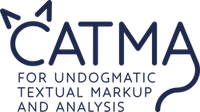Relatrice: Ms. Mari Akazawa Per partecipare, inviare una mail a lilec.lab@unibo.it
Data: 21 GIUGNO 2024 dalle 16:00 alle 18:00
Luogo: https://events.teams.microsoft.com/event/cdd70250-9456-4bcf-89ab-6caeb86861aa@e99647dc-1b08-454a-bf8c-699181b389ab - Evento online

CATMA ("Computer Assisted Text Markup and Analysis", https://catma.de) is an open-source web application for text annotation, analysis and visualization that is continuously developed at the forTEXT lab of the Technical University of Darmstadt (Germany). CATMA is part of the dissemination project forTEXT (https://fortext.net) and offers a unique combination of three main features:
What sets CATMA apart from other digital annotation methods is its “undogmatic” approach. Unlike many other systems, CATMA neither prescribes defined annotation schemata or rules, nor does it force the user to apply rigid yes/no, right/wrong taxonomies to texts (even though it allows for more prescriptive schemata as well). Instead, CATMA’s logic encourages users to explore the nuances and complexities of textual phenomena according to their needs. Users are able to create, expand, and continuously modify their own individual tag sets. If a text passage invites more than one interpretation, nothing in the system prevents the user from assigning multiple, or even contradictory annotations to it. Despite its flexibility, CATMA does not produce idiosyncratic annotations. All markup data can be exported in TEI/XML format and reused in other contexts. CATMA’s intuitive design makes it particularly suitable for humanists with little technical expertise. Its graphical user interface allows for a quick and easy start-up, and its build query function (a step-by-step dialogue-based widget) enables users to retrieve complex information from texts without having to learn a query language.
In this workshop, participants will be introduced to the core annotation and analysis functionalities of CATMA 7. The workshop will proceed in a step-by-step manner, guiding participants through the full cycle of a CATMA-based text investigation. This will commence with the upload of text data and conclude with the exploration and visualization of an annotated phenomenon.
Mari Akazawa is editor and project coordinator of the forTEXT Portal at the forTEXT lab (TU Darmstadt) with a background in computational and corpus linguistics. She holds a Bachelor in International Communication and Translation (Stiftung Universität Hildesheim) and a Master in Linguistic and Literary Computing (TU Darmstadt).